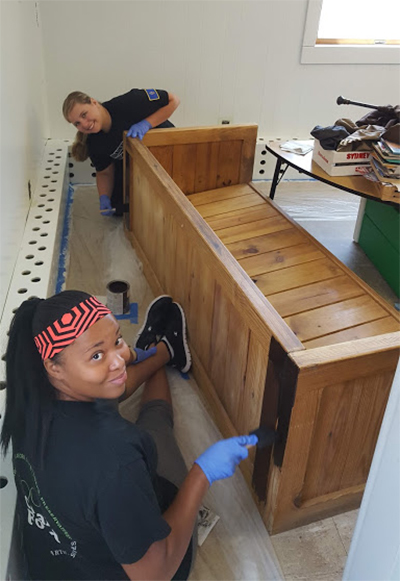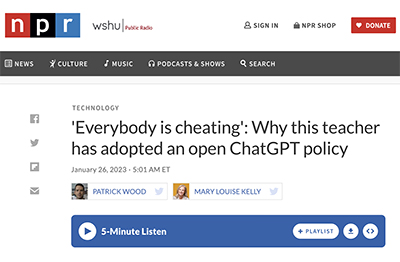Cynthia Eaton
So much has been happening in the JEDI universe, it’s hard to keep up. Below I share three updates:
A student’s biggest hope: Four colleagues’ new JEDI Share pages show how FA members transform lives and build communities Authentic Assessment: Transforming Lives, Building Communities An interior design student, Samantha Intagliata was reflecting on her experience redesigning some rooms for the Brighter Tomorrows domestic violence shelter. Professor Trudy Christ integrates hands-on, place-based, authentic assessment experiences into her courses and—wow—do her students appreciate the opportunity! Samantha found the work quite meaningful and talks about the hands-on design labor involved but adds, “There was a human element to the work that could not be obtained in a classroom. We had to understand the position of our client and some of the hardships they may be facing emotionally and physically to create a space that can nourish and lift up them.” “One of my biggest hopes,’’ Samantha continues, “is that these women and children understand that they are loved, even by strangers, and deserve to have a healthy and happy future.” Trudy has been partnering with Brighter Tomorrows and the Boys & Girls Club to provide some truly remarkable, real world learning opportunities for her majors. Read about Trudy’s inspiring work and her students’ moving commentary on her JEDI Resources: Colleagues Share page. Teaching, Like History, is About Considering Different Perspectives Adjunct instructor of history Jim Swike also works diligently to make his classes meaningful for students and to support each student in as many ways possible. And he is quite adept at responding to what might be difficult conversations about historical and political events. In his JEDI Share page, Jim describes how important it is to be kind and be respectful and to model how to carefully consider multiple perspectives. Jim also offers smart suggestions for how to build in extra supports to better ensure the success of all our students. The Brag Sheet: Help Us Help Students Earn Scholarships Having worked to promote student scholarships for so many years, Tom has seen all kinds of student applications and faculty letters of recommendation. In his JEDI Share page, Tom itemizes some of the work he does to help promote these scholarships that are especially critical to students with greater financial need, underrepresented students and first-generation college students. This funding literally transforms our students’ lives. In addition, he shares some solid advice with colleagues, including a downloadable brag sheet that can make life a bit easier for faculty when writing letters of recommendation. What I Wish More Faculty Knew about Financial Aid and the Role You Can Play to Help Protect It Jared Dowd is so dedicated to helping our most deserving students maximize their financial aid packages, he is constantly looking for more ways to engage in intrusive advising. He does not want any student to leave even an extra dollar on the table. In his JEDI Share page, Jared shares five specific things he wishes more faculty knew about financial aid so that we can better ensure students have the means to enroll at SCCC and, more importantly, stay enrolled.
How being JEDI can help address your AI concerns Since Open AI let their ChatGPT software drop last November, people cannot stop playing with it, talking about it and freaking out about it. NBC reported on January 23 that ChatGPT passed an MBA exam given by a professor at the University of Pennsylvania’s Wharton School, an informal poll of Stanford students reflect that perhaps hundreds of them relied on ChatGPT for “assistance” with their exams and assignments and other colleges and universities across the nation have been reporting widespread ChatGPT use by their student body. We saw a College Brief come out on January 23 addressing artificial intelligence (AI) concerns here at SCCC too. Those of us who focus on the teaching of writing have long been concerned about the development of increasingly sophisticated large language model chatbots. We've seen previous versions, but nothing quite like the Chat Generative Pre-trained Transformer (ChatGPT). Now, we know the program is flawed. ChatGPT knows nothing beyond the year 2021, it does not search the internet, it cannot cite its sources and it will readily present incorrect information in a way that will strike many students as perfectly plausible (AI researchers call the latter hallucination). We compositionists understand better than anyone the implications for our classrooms. I mean, if my entire career is built upon the teaching of writing and students now have a tool that is free and readily available online that can produce writing for them—and in a unique way that can dupe most current plagiarism detectors? This is obviously a concern. Broadly speaking, we can react to this in two different ways:
Personally, I think a little of both are needed. We should be concerned but we also know that people have declared for centuries how various technologies—radio, film, TV, computers, the Internet and even the printing press—were going to dismantle education. I am probably most aligned with assimilation such as the approach described by Zeynep Tufekci in this December 15 New York Times opinion piece “What Would Plato Say About ChatGPT?” and by John Warner who writes Inside Higher Ed’s Just Visiting column. Warner argues that we should not ban AI outright but instead, “If we want students to learn to write, we must give them purposeful and meaningful practice at thinking while engaging with writing experiences.” This is why I think being JEDI is the smartest approach to these AI concerns. By this, I mean that being more “JEDI” in our classrooms requires us to think more closely about all of our students’ experiences and to show students that we truly value their different experiences and perspectives. Because I did my graduate work at UMass Amherst and studied under Peter Elbow, Anne Herrington, Charlie Moran and others, I have long valued (and based my grades on) both process and product in student writing and I have long required my student writers to maintain a balance among their analysis of course texts, their external research and their experiential evidence. Keeping students’ lived experiences at the center of each essay not only helps them establish their ethos as the writer but also better ensures they embark on research topics they genuinely care about and want to explore. And I show them that I genuinely care to learn about their personal experiences and individual perspectives. Doing so is also one kind of authentic assessment of the sort Trudy Christ describes in her JEDI Share page, which I strongly encourage you to read. Overview of the JEDI January 6 winter workshop Finally, I want to give a shout out to all who participated in our JEDI winter workshop on Friday, January 6. We had 47 participants total, which is terrific for a wintersession meeting. Special thanks go to those who served on our panel discussion: Tom Flesher (Economics), Kathy McCoy (Honors), Michelle Saavedra (English) and Bruce Seger (Library). We are also grateful to Caitlin Compton-Almo (Human Services) and Lauren Liburd (SCC Foundation) who shared their advice about crafting a more inclusive syllabus. You can download our sample JEDI syllabi on our JEDI Institute website. The majority of the meeting was devoted to sharing ideas and engaging in conversation as we work to reflect, reframe, refresh and reset for another strong JEDI semester at SCCC. And, as always, we could not do any of the good work of the JEDI Institute without the leadership, guidance and support of Chief Diversity Officer Christina Vargas. Keep an eye out for Chris’ workshop during Professional Development Day on February 28. Have a fabulous spring semester and please contact us to share your JEDI strategies! We continue to collect and add to the Colleagues Share section of the JEDI Institute website. |

